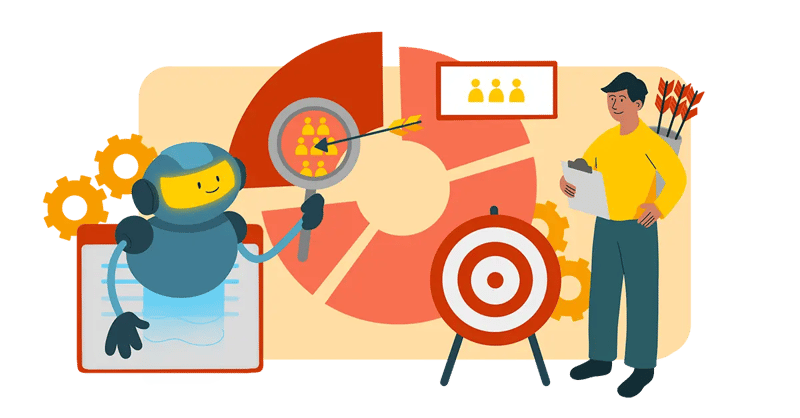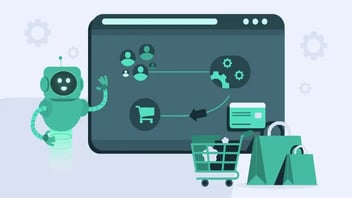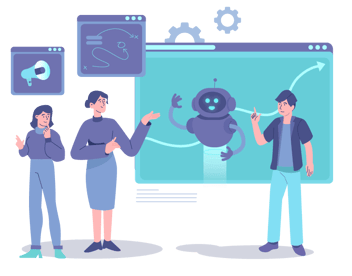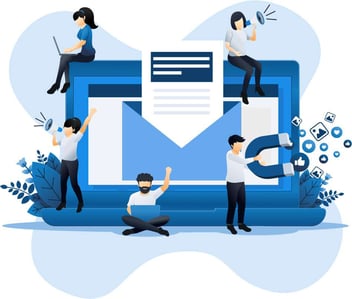SaaS Marketing: How to Apply AI and Machine Learning Techniques
Software as a Service (SaaS) has become one of the fastest-growing industries in the world. Part of its rapid expansion is due to artificial intelligence (AI) and Machine Learning (ML).
AI and ML are two similar but distinct forms of technology. This tech uses existing data and automated processing techniques to organize data, optimize digital systems, and make highly accurate predictions about consumer behavior. And it does all this in the blink of an eye.
One of the many areas in which AI and ML can assist growing SaaS companies is by improving their marketing strategies.
Read on to find out more about SaaS marketing through the lens of AI and ML. We've delved deeper into how you can use this technology to make your consumers feel happier, more engaged, and more satisfied with your services.
What is AI and ML's Role in SaaS Marketing?
AI and ML can and have, for some time now, changed the way businesses manage critical consumer data. This tech helps businesses understand their customer's needs in a more accurate and lateral way. It also optimizes marketing campaigns, drives ROI, and organizes enormous quantities of data.
When it comes to the SaaS industry, businesses rely on a comprehensive grasp of consumer needs to keep usability and profits high. Software services need to be intuitive, easy to navigate, and, above all, highly efficient in order to remain competitive and provide a good user experience.
These advanced forms of technology are exactly what businesses that provide these services need.
Integrating AI and ML to SaaS Marketing
There are numerous different ways to integrate AI and ML into SaaS marketing strategies. However, not all of them will necessarily be right for your company or your team. Fortunately, there's room for you to explore a variety of different AI and ML-driven marketing techniques that are specifically geared towards SaaS-adjacent audiences.
We've rounded up a few of them for you to use as inspiration when developing your next marketing campaign.
1. Make your engagements personal
Personalization is one of the most significant ways that any SaaS business can attract and retain loyal consumers. It just so happens that AI and ML are two of the best tools for achieving this.
Studies show that customizable interactions and personalized content are highly popular among consumers, and it's easy to understand why.
Personalization makes people feel special—as though someone recognizes them for who they are. But while the reality may be a little more corporate than that, you can still encourage people to feel individually acknowledged by using technologies that are specifically designed to do so, such as AI.
Take Spotify, for example. It is a SaaS company that uses AI to monitor existing consumer data and create personalized playlists and "Wrapped" features that give the user a sense of individuality.
2. Use chatbots to enhance engagement
AI chatbots are a form of ML that draws on real-time engagements with consumers to create cohesive back-and-forth conversations based on each message that the consumer sends. The chatbot then provides a response that is as helpful, informative, and appropriate as possible.
Using an AI-powered chatbot builder, you can build a chatbot that can help solve some of your digital consumer's problems in a few minutes. Chatbots, or AI agents, can also enhance engagement by motivating consumers to interact with your systems in multiple different ways.
3. Embrace predictive analytics for consumer behavior
Predictive analytics is a form of AI and ML that uses existing consumer data as a map to determine how they will behave in the future. It not only provides metrics on current trends but also helps to track the success of campaigns and highlight where improvements are needed.
In the past, this aspect of marketing required brain power alone. Now, we have tools that can do it for us.
When it comes to the SaaS industry, understanding what customers want (as well as in what format, when, how, and what kind of options they seek) is crucial for curating services that actually align with constantly changing consumer needs.
4. Work with customer segmentation
In marketing, market or customer segmentation is the technique of dividing consumers into distinct groupings based on common behaviors and preferences. Both AI and ML can be utilized in this area. They can help you better understand what motivates different groups to make purchases, exit subscriptions, or continue using your software services in a particular way.
There are various AI and ML-driven tools that specialize in making customer segmentation easy and ongoing for SaaS businesses and other types of business models.
5. Create consumer-optimized marketing content with AI
You don't need to be strictly SaaS to use this marketing technique to your advantage. Whether you're selling software or publishing a creative portfolio, you need content that consumers can relate to, that engages and interests them, and adds value.
In addition to an up-to-date website that is correctly optimized for SEO, you also need to consider that a vast number of online users head straight to social media to find answers to questions or get the latest news. This means that your content must be optimized for Facebook, Instagram, TikTok, and any other platforms you're active on.
You can use AI to generate written and visual content for your marketing campaigns to maintain consistency across platforms. This ensures you offer audiences something that truly aligns with their preferences from a content consumption perspective.
6. Educate and train your team on AI and ML processes
Before you dive into the fairly complex world of AI and ML processes, it's crucial that your team understands the basics of how and why these processes work.
If you plan to implement AI or ML techniques into your marketing strategy, consider setting up a workshop or training session to ensure everyone is on the same page.
Overcoming Key Adoption Challenges
Integrating AI and ML into your SaaS marketing practices offers massive potential. That said, it's important to understand the potential challenges involved as well. Understanding these challenges is the key to overcoming them and ensuring the successful adoption of advanced technologies into your marketing workflows.
Some of the most common challenges involved when integrating AI and ML into SaaS marketing include:
-
The expense of integration. Adopting artificial intelligence and machine learning can require notable upfront investments.
-
The potential for skills shortages and the need to hire professionals or train team members on the use of new technology.
-
Concerns around data privacy.
-
A slow pace of change--or resistance towards change --within your workplace culture and teams.
These challenges need to be addressed proactively and innovatively for the best results. Consider dealing with these potential obstacles by:
-
Keeping your data protection framework and systems regularly updated. This will help to mitigate privacy and data safety concerns.
-
Providing frequent and ongoing training for teams and professionals who will use AI and ML. This helps to ensure that they are equipped with the skills they need to work with confidence.
-
Encouraging consistent collaboration between marketing and AI teams. This approach will help to ensure that AI and ML technologies are implemented seamlessly.
-
Creating a culture of clear, concise communication with respect to the benefits and long-term impacts of AI adoption. Maintaining clarity can foster eagerness and support from every level of your organization. This, in turn, may further streamline the implementation of new technologies.
Trends Driving the Future of SaaS Marketing
SaaS marketing has a bright and productive future ahead, especially as rates of AI and ML adoption continue to increase. One key trend to pay attention to is hyper-personalization. This involves using AI-powered data analysis and machine learning algorithms to deliver highly personalized marketing content and customer experiences to target audiences.
The use of data-based platforms is expected to become increasingly widespread. These platforms are also vital to creating hyper-personalized customer experiences that engage audiences and maintain this engagement for as long as possible.
The needs of modern customers are becoming more complex than ever before. These platforms can aid marketers in meeting consumer demands and continually adapting their approaches as new trends and technologies emerge.
Both ML and AI are here to stay and are set to play unparalleled roles in shaping future SaaS marketing efforts. These technologies are becoming more sophisticated at a rapid pace, and as they do, they will be able to provide more in-depth predictive analytics and automation features.
Tools like advanced analytics and AI chatbots will become more widely employed than ever.
The result?
A transformation in how SaaS organizations build recognition and interest in their offerings. These tools are also becoming more interconnected by the day, which is another trend that may surface in future SaaS marketing workflows.
Emerging technologies like augmented and virtual reality may soon start to appear more often in SaaS marketing. Their adoption will aid marketers in creating more captivating, memorable experiences for prospective customers.
SaaS organizations that want to continue leading their sectors should lean into these trends and remain flexible as technologies continue to advance. Some of the most successful businesses are already using ML and AI to optimize virtually every level of their marketing funnels.
From lead generation to personalized content delivery, they are already being used with great success. According to Jessica T., CMO at Team Intelligence:
"Integrating AI and ML into our marketing SaaS tools has transformed how we approach our campaigns. We've not only improved our engagement rates but also significantly decreased our campaign costs. [We have achieved this] by targeting our customers more effectively and at the right times."
Industry leaders are also using these technologies to streamline their decision-making processes, automate repetitive tasks, and provide their target audiences with customized experiences designed to exceed their expectations and make consistently strong impressions.
Conclusion
Businesses that offer software as a service are far better equipped to meet consumer needs today than they ever have been—and we have AI and ML to thank for that.
These powerful forms of technology have catapulted marketing techniques to new heights of success by enabling SaaS companies to develop more robust personalization features, predict future consumer behavior, and learn how to best meet consumers' needs and expectations.
SaaS businesses that choose to embrace AI and ML rather than avoid it are the ones that will survive the coming years in this competitive industry.
This content is also available in:
- German: SaaS-Marketing: Wie man KI und maschinelle Lerntechniken anwendet
- Spanish: Marketing SaaS: IA y las técnicas de aprendizaje automático (ML)
- French: Marketing SaaS : Comment appliquer les techniques d'IA
- Italian: Marketing SaaS: Tecniche di IA e apprendimento automatico
- Romanian: Marketing SaaS: Cum să aplicați tehnicile de AI și învățare automată
- Chinese: SaaS 营销:如何应用人工智能和机器学习技术

Opinions expressed in this article are those of the guest author. Aspiration Marketing neither confirms nor disputes any of the conclusions presented.









Leave a Comment